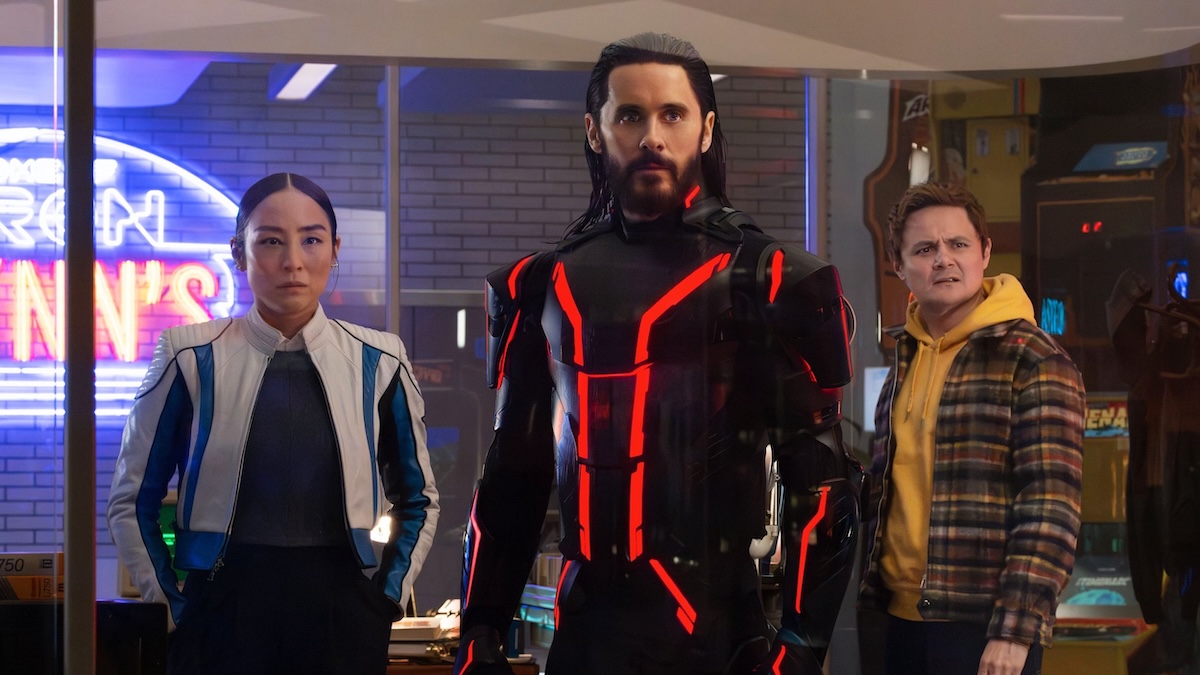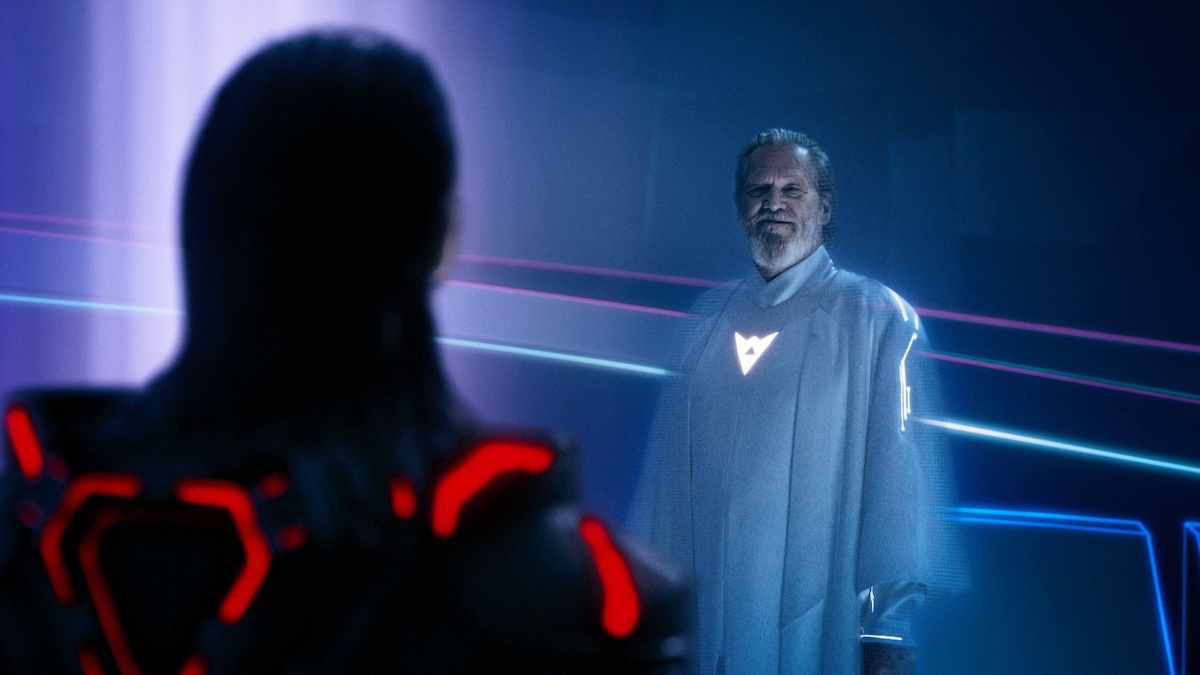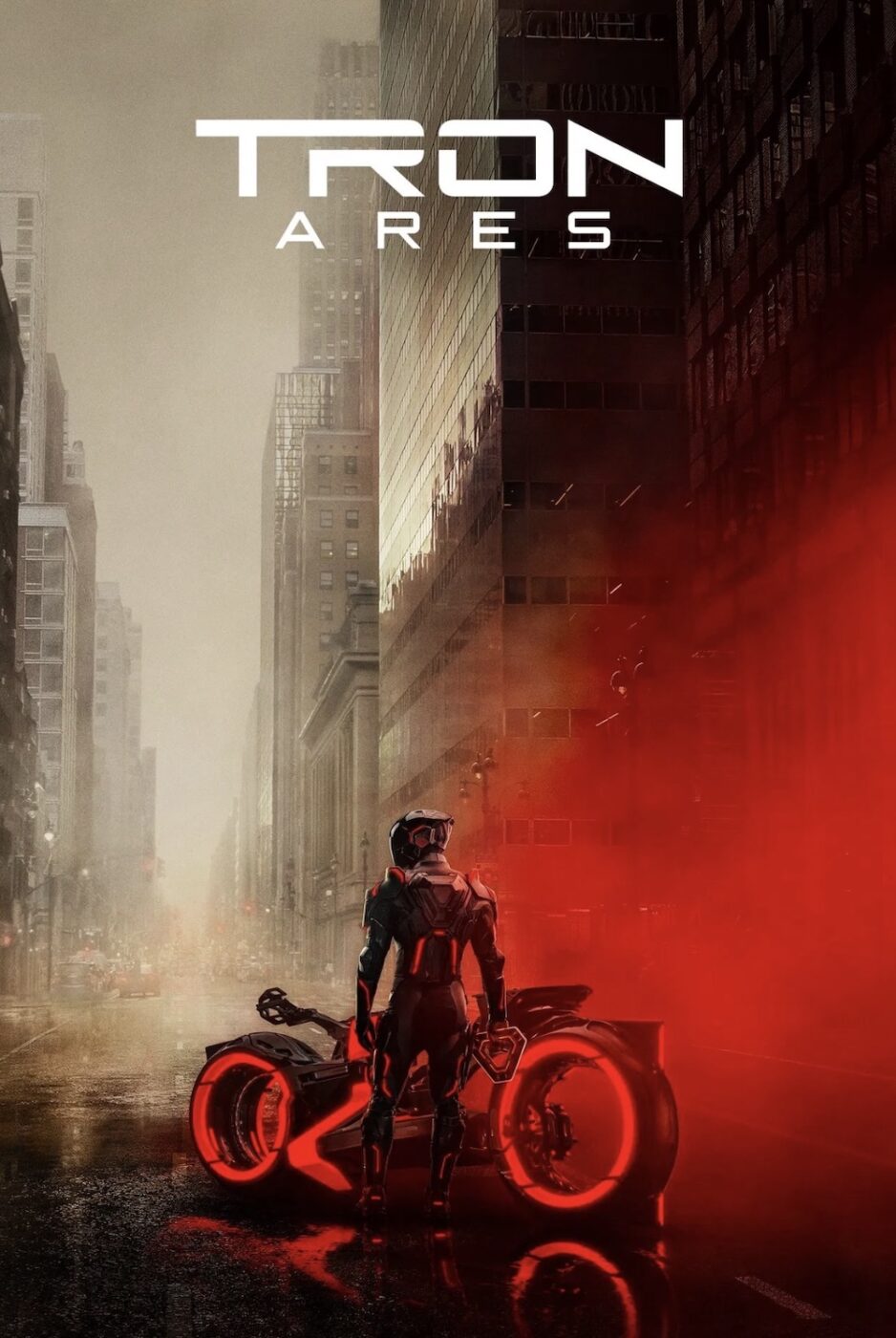TRON: ARES (2025)
A highly sophisticated program, Ares, is sent from the digital world into the real world on a dangerous mission.

A highly sophisticated program, Ares, is sent from the digital world into the real world on a dangerous mission.

Disney’s Tron franchise has a peculiar, tenuous position in pop culture. The original Tron (1982) was a groundbreaking VFX spectacle that was unfairly snubbed at the Academy Awards, as they considered its use of computer-aided design to be “cheating”, thus disqualifying it for the ‘Best Visual Effects’ Oscar. How times change! And despite Tron becoming Disney’s highest-grossing live-action movie since 1977, grossing $50M, it was deemed a box office disappointment considered its then-enormous $17M production budget.
Reviews for Tron were mixed upon release, but it captured the imagination of a generation of children and geeks, inspiring many fans to join the SFX industry themselves. So, nearly 30 years later, a sequel was made now those Tron defenders had come of age and the search for profitable IP was well underway in Hollywood. Joseph Kosinski’s resulting Tron: Legacy (2010) was a technical marvel and a slick update of its predecessor’s iconic design language, but the sequel was again seen as a financial underachiever that only appealed to middle-aged geeky men. Critics praised the visuals and the incredible synth music score by French duo Daft Punk, but it didn’t really break through into the mainstream.
That makes the arrival of Tron: Ares, 15 years later, feel like something of a miracle, but perhaps Disney have a third-time’s-the-charm wish to nail the promise of what Tron could be as a franchise. Norwegian filmmaker Joachim Rønning (Pirates of the Caribbean: Dead Men Tell No Tales) takes over as director, someone also perceived as a visual stylist akin to Kosinski, but Jesse Wigutow’s screenplay doesn’t continue directly from Tron: Legacy—despite that movie’s ending teasing what Ares explores more specifically, with computer programs visiting the real world.

One reason I described Tron as having a peculiar position in pop culture is that everyone knows its iconography, and many people have fond memories of sequences from the 1982 movie (especially the Light Cycles), but the clarity of the plotting and even comprehending the concept is of secondary importance. Even after Legacy, few people would be able to recount much about its characters or narrative, as you’re almost overwhelmed by the sensory experience of spending time inside its vibrant tech world. It reminds me of a theme park ride, and with Legacy and now Ares both embracing the 3D cinema experience, that notion of feeling not following the movie hasn’t gone away.
The story, for what it’s worth, picks up 15 years after Tron: Legacy. ENCOM and Dillinger Systems, now led by Julian Dillinger (Evan Peters), are both in a technological race to bring digital life into reality with a permanence that currently eludes both parties. Julian posits a future full of A.I. armies and high-tech vehicles that can be 3D-printed into existence, then replaced almost instantly should they perish, with no loss of human life, but nothing he creates can last beyond 29 minutes. And that includes the eponymous Ares (Jared Leto), the new ‘Master Controller’ program, whom he wants to showcase as the ultimate expendable soldier.
But when Julian’s rival at ENCOM, new CEO Eve Kim (Greta Lee), discovers the code for permanence hidden in software left behind by computing pioneer Kevin Flynn (Jeff Bridges), their corporate battle turns deadly once Julian starts using Ares and his second-in-command Athena (Jodie Turner-Smith) to acquire the elusive code for himself. And in true Frankenstein and Pinocchio tradition, as both classic stories are referenced, matters are complicated once Ares starts developing self-awareness and a desire to escape his digital prison and live in the real world…

Tron: Ares succumbs to similar issues Legacy faced, where the look and feel of this world is more intoxicating than the storytelling and characters. However, it tells a simpler and more comprehensible story, by virtue of wearing its literary influences on its sleeve and simply applying the Tron aesthetic to a hero’s journey we’ve seen many times before. It also helps that, unlike in 2010, audiences are even more familiar with notions of artificial intelligence and virtual worlds. Indeed, A.I. is basically here now and people can play VR games at home.
I remember it feeling like a ludicrous stretch for Legacy to end with software programs in our world, but with 3D printing also now a reality, it didn’t feel so ridiculous as presented in Ares. You just have to accept the underlying conceptual nonsense of the ’82 Tron that motherboards and circuits inside every computer contain anthropomorphised digital “people”. It’s a bit like a computational take on UK comic strip The Numskulls, or Inside Out (2015), so you just have to go with the lunacy. Besides, I’ve come to believe we’re really just seeing the interactions of code portrayed in a way that makes sense to us as a human audience — much like how The Matrix (1999) works, when you see the virtual world displayed as nothing but lines of green code to those in the real world.
The USP of Ares is that the iconic elements of the Tron franchise enter our world, most notably those super-fast Light Cycles, before a Tetris-like ‘Recognizer’ ship eventually stalks city streets during the third act. Plus we see characters in those stylish tight-fitting uniforms with luminescent piping, flinging discus at each other and engaging in combat using staff weapons and big guns. The prospect of seeing these elements of Tron in our everyday world is alluring if you’re a geek, and it’s effectively portrayed to enjoyable and exciting effect. I was reminded of Glen A. Larson’s short-lived Automan (1983–84), a TV series heavily inspired by the VFX of Tron that followed the adventures of a crime-fighting A.I. hologram, so it’s amusing to realise the Tron franchise has started to emulate one of its own imitators after four decades!

One aspect of Tron: Ares that does most of the heavy-lifting is the original music score by Nine Inch Nails, which is a constantly pulsating and bass-heavy mix of sounds and synth wails. Much like Daft Punk’s (admittedly superior) score in Legacy, NIN’s music elevates everything by an extraordinary degree. It feels fresh and different to what one might expect from blockbusters of this nature, and creates a sense of weight and seriousness to many sequences that wouldn’t be as strong if the film was wholly reliant on the story and performances to make the action sequences land. NIN band members Trent Reznor and Atticus Ross serve as executive producers on the film, and it’s undeniable their musical contributions alone are a significant reason to see the film.
The 3D is another element many will find appealing, although unlike Legacy the boom for that format, post-Avatar (2009), has significantly waned. It remains true for most cinemas that passive 3D, achieved through lenses glasses, makes the image relatively dim, and Ares is already a darker movie by design than the previous two. That said, the abundance of VFX and the contrasting two-tone look to the movie — especially the primary red/black aesthetic — helps make the 3D look convincing and the added depth to everything aides the believability of this virtual world. I personally enjoyed the 3D experience, mainly because the concept of Tron lends itself to the more immersive sense of presence it can deliver at its best.
One again, however, the main problem with Tron: Ares is that the human component is a little lacking. Even if no actor is doing objectively bad work, even the somewhat divisive Jared Leto (Morbius), who often seems to turn up in genre fare and curse the whole project. Everyone does what’s required of them in the script, and there’s certainly entertainment to be had from Evan Peters’ asshole CEO, Jodie Turner-Smith’s late villainous turn, and Leto himself is fairly charismatic as a sexy A.I. warrior who longs to become a real force for good. But the characters are fairly sketched-in and often saddled with terrible dialogue, or meaningful exchanges that fumble the ball —like a first draft’s placeholder material wasn’t touched. Much like in Legacy, this means the movie fails to deeply connect on an emotional level, so you come away impressed by the audio-visual experience and mostly entertained by the fun of what’s happening… but with no real compulsion to ever watch it again. But you’ll definitely be adding that NIN soundtrack to your playlist.
USA | 2025 | 119 MINUTES | 1.90:1 (IMAX) • 2.39:1 (THEATRICAL) | COLOUR | ENGLISH


director: Joachim Rønning.
writer: Jesse Wigutow (story by David DiGilio & Jesse Wigutow; based on characters created by Steven Lisberg & Bonnie MacBird).
starring: Jared Leto, Greta Lee, Evan Peters, Jodie Turner-Smith, Hasan Minhaj, Arturo Castro, Gillian Anderson & Jeff Bridges.
